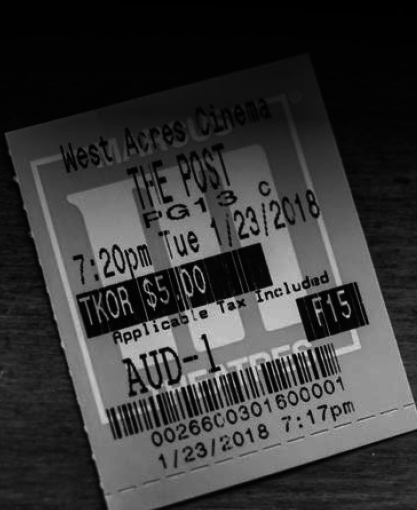Kay Graham, the first female publisher of The Washington Post (played by Meryl Streep), is up against the men in government and the men in the press. But when it comes to protecting First Amendment rights, she knows just what to do.
‘The Post’ is a gripping tale that keeps your interest from start to finish.
If I’m going to be honest, my main reason for seeing this movie was Tom Hanks — I’ll watch any movie that man is in — but the free press spilling government secrets and having to fight for the freedom of speech is what kept my attention.
The movie starts like any 20th century war portrayal movie you watched in your high school history class, with Creedence Clearwater Revival and the whirring of a helicopter blade. The Vietnam War, arguably one of America’s greatest mistakes, sets the scene.
American military analyst, Daniel Ellsberg (played by Matthew Rhys) is assigned to observe the goings-on of the war and give his opinion to Secretary of Defense Robert McNamara (Bruce Greenwood). When Ellsberg relays the message that things are not going well, something McNamara already suspects, McNamara goes on to lie to the public and says situations are improving for the boots on the ground.
Ellsberg’s disgust in McNamara’s lie encourages him to make copies of the classified documents on the Vietnam War that he stole from the Pentagon and disperse the government’s years of lying to the press in order to seek justice for the many Americans risking their lives in Vietnam.
The Washington Post, Graham’s family business, fell into her hands when her husband committed suicide and she became the matriarch of the rising publication.
Being the first and only female publisher in 1971, Graham was constantly being shut down by her male colleagues. This would soon change and everyone would know her as the powerful woman who brought the Post out from the shadow of its competition, The New York Times.
A writer for the Times is the first to break the earth-shattering news to the world that the government has always known that they would never be able to win the war in Vietnam, but kept sending soldiers anyway to avoid the humiliation of a loss.
As soon as the news is broken, the Times is being shut down for their act of treason. But little does the government know, The Washington Post has another story to tell.
Bumping elbows with the nation’s highest can have its pros and cons, but when Graham is faced with betraying her friends in the Oval Office, she is torn.
Every member of her board is telling her not to publish the classified papers in order to keep the paper safe, but executive editor Ben Bradlee (played by my hero Tom Hanks) urged her to let the people know the truth about the deceitful acts of our beloved presidents.
Graham goes back and forth between maintaining the safety of her family heirloom and letting America know the truth about the Vietnam War. To claim the Post as her own, and not her male subordinate’s, she chooses in favor of America and publishes the documents that reveal America’s greatest mistake.
‘The Post’ is a movie about journalism in the days of the Watergate Scandal and the Vietnam War, where Graham’s feminism juxtaposes with an established guard of male leadership. Although wavering, Graham ultimately opts on the side of justice.
The ‘60s and ‘70s sparked an era of distrust in the American government that still has not left society. For this reason, Streep and Hanks’s first-rate performance in ‘The Post’ is an engaging story for all viewers.
